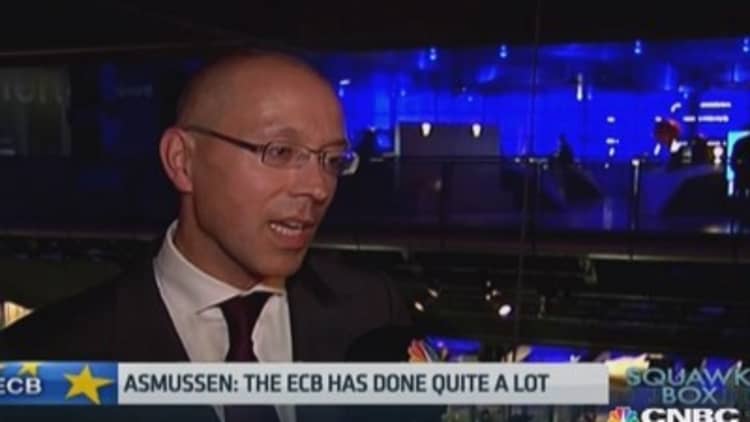
The latest governing council meeting of the European Central Bank (ECB) may have lacked the fireworks of the previous month's, but following Thursday's rate decision central bank watchers received an insight into the concerns that still persist for some of its members.
ECB policymaker and President of the German Bundesbank Jens Weidmann warned on Thursday that the stimulus policies being delivered by the ECB could - over time - lead to financial risks such as exorbitant gains on real estate markets.
In a speech at a conference hosted by Germany's conservatives in Berlin, he said that low interest rates in the region are easing the pressure on euro zone governments to push forward with reforms, according to Reuters. He added that the ECB should therefore not leave policy loose for too long.
Read MoreECBsurprises with meeting changes, minutes
The ECB left monetary policy unchanged at Thursday's meeting after it announced a raft of measures in June to combat the euro zone's growth-sapping disinflation and spur its recovery. ECB President Mario Draghi sounded a dovish note, giving further details on the bank's new long-term lending program for banks and also announced that the frequency of the bank's meetings would change to a six-week cycle from January 2015.
Germany has typically shown the most resistance to low interest rates and ultra-easy policy as the economic powerhouse has outperformed its neighbors and has constant concerns that inflation could hurt its exports. Weidmann's tone seemed to change during the run-up to June's ECB meeting, with even Germany's inflation figures failing to gain any real traction, but his latest comments seem to tally with his long term view on the region's recovery.
Read MoreWorldmarkets react to US jobs, ECB's inaction
Meanwhile, another ECB board member Benoit Coeure remained adamant that governments should not view low interest rates as "an invitation to abandon the path of fiscal prudence," according to Reuters. Thus, Coeure was trying to directly alleviate the concerns coming from German officials.
"Governments have to continue on their path towards resilient public finances," said Coeure, who was quoted by the news agency. "They should stick to the rules they have agreed under the new EU fiscal framework and not stretch them to the point where the credibility of this framework would be harmed."
Read MoreEurozone retail sales stall as households feel pain
Former ECB executive board member Jörg Asmussen, who left the bank for a post in Germany's new coalition government, remained coy on the concerns expressed by Weidmann. Refraining to comment directly on the ECB's new series of measures in June, he did tell CNBC that the central bank had done "quite a lot", adding that its monetary policy was expansionary and was rightly so.
"I think we are not in a situation where we risk deflation. We will see..relatively low inflation for a protracted period of time," he said.


